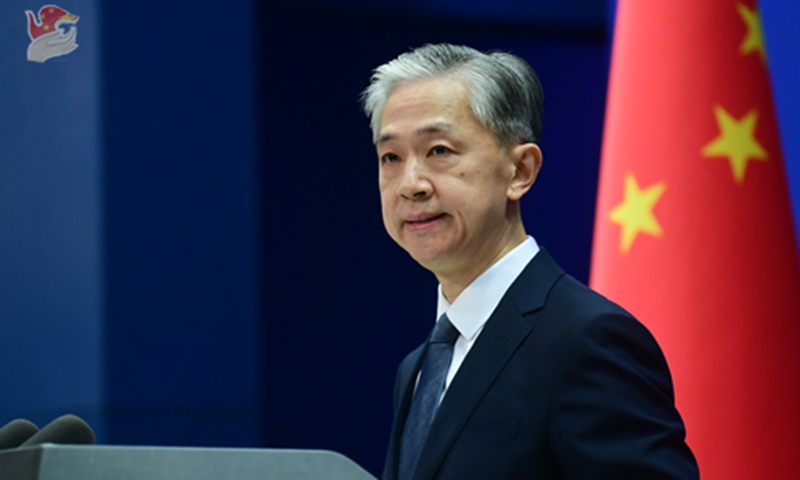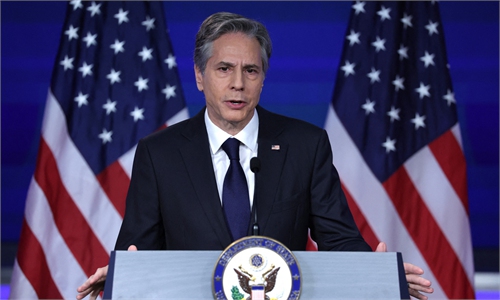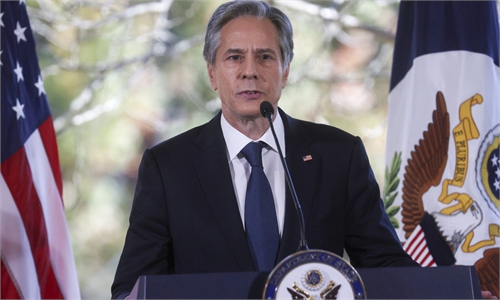
Chinese Foreign Ministry spokesperson Wang Wenbin Photo: fmprc.gov.cn
China firmly opposes US Secretary of State Antony Blinken's speech on China policy, which spread false information, hyped the China threat and interfered in China's internal affairs, Chinese Foreign Ministry spokesperson Wang Wenbin said on Friday, adding that Blinken's purpose was to suppress China's development and safeguard US hegemony.
Blinken delivered a speech on the US' China strategy on Thursday, describing China as the "most serious long-term challenge to the international order." Blinken's claim is false and a smear on China's domestic and foreign policies, Wang said on Friday.
The claim completely confused right and wrong, Wang said. China has always and will be a defender of the international order. We uphold the international system with the United Nations at its core, the international order underpinned by international law and the basic norms of international relations based on the purposes and principles of the UN Charter, Wang said.
Wang urged the US to join China in upholding the international system, rather than spreading rhetoric and smearing others.
However, the so-called rules-based international order only upholds the order dominated by the US, Wang said, noting that the US has always put its national law above international laws, and this is the biggest source of chaos for the international order. The US maintains an attitude of using international rules when they suit its interests and abandoning them otherwise.
Blinken said that the US doesn't want a new Cold War and doesn't seek to block China from its role as a major power, and nor does it want to stop China from growing its economy. Wang stressed that China noticed that and will wait and see.
Mankind has entered a new era of connectivity that closely links countries in their interests and destinies. The pursuit of peace, development and win-win development is an irresistible trend of the times, Wang said.
All countries should stand together and cooperate in solidarity to maintain world peace and stability, to deal with the pandemic and to revitalize the world economy. The US hypes the China threat, which can't solve its own problems, but will lead the world to a dangerous position, according to Wang.
Peace, development, democracy, freedom, fairness and justice are the common values of mankind, and democratic and human rights are historical, concrete and realistic. Countries can only proceed from the realities of their own conditions and the needs of their people to explore a development path that suits them, according to Wang.
China always adheres to the principle of consultation, joint contribution and shared benefit, and agrees that all countries should jointly control the destiny of the world, Wang said.
Forming a "small circle" or a "small clique" is to run against the historical trend. The Indo-Pacific strategy concocted by the US appears to be aimed at forming cliques in an attempt to contain China; the US hopes to "change China's surrounding environment," which is doomed to fail, according to Wang.
China advocates and upholds the Five Principles of Peaceful Coexistence, and is committed to establishing and developing friendly and cooperative relations with all countries. The label of "coercive diplomacy" can't be pinned on China, while the US is the "inventor and intellectual property owner" of coercive diplomacy, Wang noted.
The US said it does not support "Taiwan independence" but it repeatedly violates the political commitments it has made to China, Wang said. The US attempts to hollow out the one-China principle and inflates the arrogance of the "Taiwan independence" forces on the island, which puts peace and stability in the Taiwan Strait in serious jeopardy, according to Wang.
The essence of Xinjiang-related issues is the issue of countering violence and terrorism, de-radicalization and anti-separatism. The so-called "genocide" and "forced labor" issue is a century-old lie, Wang noted.
What the US talks about is "competition," but what it is actually doing is generalizing the concept of national security. The US launches illegal unilateral sanctions and wields long-arm jurisdiction and decoupling, seriously damaging the legitimate rights and interests of Chinese enterprises and harming other countries' right to development. This is not "responsible competition," but rather a crackdown without a bottom line, said Wang.
Is it confrontation or dialogue and cooperation? Is it win-win or a zero-sum game between China and the US, Wang asked. The US should act in the common interests of the two countries and the people of the world, and make the right decision.
President Joe Biden has stated that the US has no intention of seeking a new Cold War or changing China's system. He also said that the revitalization of US alliances is not anti-China, that the US does not support "Taiwan independence," and that it is not looking for conflict or confrontation with China.


